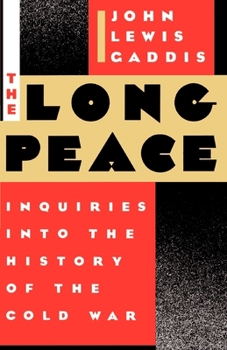The Long Peace: Inquiries Into the History of the Cold War
Select Format
Select Condition 
Book Overview
In this fascinating new interpretation of Cold War history, John Lewis Gaddis focuses on how the United States and the Soviet Union have managed to get through more than four decades of Cold War confrontation without going to war with one another.
Using recently-declassified American and British documents, Gaddis argues that the postwar international system has contained previously unsuspected elements of stability. This provocative reassessment of contemporary history--particularly as it relates to the current status of Soviet-American relations--will certainly generate discussion, controversy, and important new perspectives on both past and present aspects of the age in which we live.
Using recently-declassified American and British documents, Gaddis argues that the postwar international system has contained previously unsuspected elements of stability. This provocative reassessment of contemporary history--particularly as it relates to the current status of Soviet-American relations--will certainly generate discussion, controversy, and important new perspectives on both past and present aspects of the age in which we live.
Format:Paperback
Language:English
ISBN:0195043359
ISBN13:9780195043358
Release Date:February 1989
Publisher:Oxford University Press
Length:352 Pages
Weight:0.50 lbs.
Dimensions:0.7" x 5.3" x 8.0"
Customer Reviews
2 ratings
New Perspectives
Published by Thriftbooks.com User , 16 years ago
Many historians have taken the viewpoint that the Cold War was a great time of strife and conflict and that we were merely a second away from total war with the Soviet Union. Although there was never any formal war between the Soviet Union and the United States, we nonetheless were in conflict in all aspects of society with each other. But John Gaddis in his novel "The Long Peace: Inquiries Into the History of the Cold War" puts forth the argument that the Cold War in fact, as the title suggests, actually time of great peace between the superpowers in terms of open warfare. In it he tries to examine why this "Long Peace" existed, and the factors that contributed to the war staying "Cold" and never escalating to direct military action between the two super powers. Gaddis also presents an interesting viewpoint of the Cold War as possibly being a necessity to both countries. He outlines the war from several different viewpoints and draws on the central theme that most likely we never went to war over direct fear of one another and that inevitably that is not what either country ever wanted. "The Long Peace" is essentially a collection of essays from primarily the United Sates archives. Gaddis breaks down the novel into several key chapters. Firstly he addresses how Russian-American relations were prior to the outbreak of the Cold War. Leading up to and including World War Two. This is essential as we learn that even during World War Two, the U.S. was already viewing the possibilities of the Soviet Union as a threat post-war. Most people would deem a viewpoint that the United States and Russia merely stayed in the Cold War for "world ranking" as erroneous. But Gaddis gives us compelling arguments as to why this actually may have some truth. If, according to the documents Gaddis puts forth, the U.S. did not engage in it's multi-faceted approach against communism, not only would we be less powerful militarily today, but we may not be nearly as important in a world scale. By the both powers escalating the conflict to possibly more then it actually was, it allowed them respectively to increase things such as military spending astronomically. Reasoning behind why the U.S. and the Soviet Union inevitably never attacked one another varies. But one prime example Gaddis entertains is the possible inherent fear we had over one another during the Cold War. This fear was bred further by the existence of nuclear capabilities during the era. Both powers had the capabilities to the kill the other more then ten times in an open nuclear war. So with the existence of nuclear war, most thought it was inevitable should the U.S. and the Soviet Union ever actually get into a war, they would bring there nuclear arms to bear. But in truth and with the realization that should a actual war begin between the two, it would quickly escalate to a nuclear one. This in turn would lead to the inevitable demise of both countries. One aspect that Gaddis did not address too str
Good Look at USSR v. US post WWII
Published by Thriftbooks.com User , 24 years ago
A good look at the history of relations between the Soviet Union and the United States in the period between WWII and the mid 1980's. Lack of information from Soviet sources (because they weren't available) a drawback, but good perspective from the NATO side.






